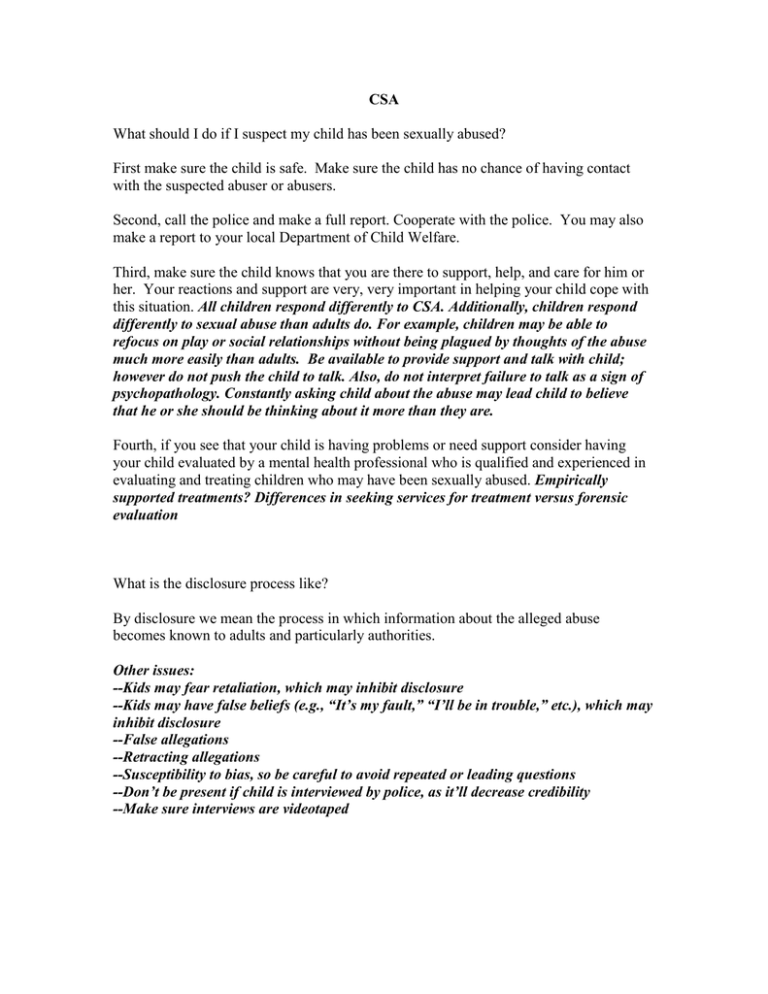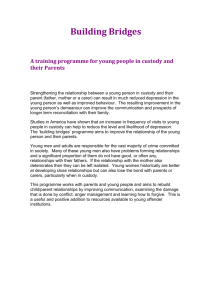CSA What should I do if I suspect my child has... First make sure the child is safe. Make sure...
advertisement

CSA What should I do if I suspect my child has been sexually abused? First make sure the child is safe. Make sure the child has no chance of having contact with the suspected abuser or abusers. Second, call the police and make a full report. Cooperate with the police. You may also make a report to your local Department of Child Welfare. Third, make sure the child knows that you are there to support, help, and care for him or her. Your reactions and support are very, very important in helping your child cope with this situation. All children respond differently to CSA. Additionally, children respond differently to sexual abuse than adults do. For example, children may be able to refocus on play or social relationships without being plagued by thoughts of the abuse much more easily than adults. Be available to provide support and talk with child; however do not push the child to talk. Also, do not interpret failure to talk as a sign of psychopathology. Constantly asking child about the abuse may lead child to believe that he or she should be thinking about it more than they are. Fourth, if you see that your child is having problems or need support consider having your child evaluated by a mental health professional who is qualified and experienced in evaluating and treating children who may have been sexually abused. Empirically supported treatments? Differences in seeking services for treatment versus forensic evaluation What is the disclosure process like? By disclosure we mean the process in which information about the alleged abuse becomes known to adults and particularly authorities. Other issues: --Kids may fear retaliation, which may inhibit disclosure --Kids may have false beliefs (e.g., “It’s my fault,” “I’ll be in trouble,” etc.), which may inhibit disclosure --False allegations --Retracting allegations --Susceptibility to bias, so be careful to avoid repeated or leading questions --Don’t be present if child is interviewed by police, as it’ll decrease credibility --Make sure interviews are videotaped CHILD CUSTODY What should I do if I become involved in a child custody dispute? Retain legal counsel and/or be aware of state laws concerning child custody. States are nearly unanimous that the best interests of the child involve joint custody (American Law Institute’s Principles of the Law of Family Dissolution; 2002) and thus, assessment instruments that attempt to operationalized the best interests of the child will be relevant in all states. This appears to be supported in the empirical literature that shows that better child outcomes post divorce are associated with either joint custody or substantial contact with the noncustodial parent (Emery, 1999). Generally, most states consider children’s wishes, parental cooperation, domestic violence, and parent and child health when making custody placements. However, be aware that laws vary from state to state. What should I be aware of if a psychologist has be retained to evaluate me and my partner for the purposes of recommendations for child custody placement? Many reviewers have suggested that currently there is a lack of scientifically valid assessment instruments and strategies for determining child custody (O’Donohue & Bradley, 1999; Otto, Edens, & Barcus, 2000). It has also been noted that many of the most commonly used measures in this area are not legally relevant. That is, the content of these assessments do not capture domains that state laws and legal guidelines consider when making child custody placements (O’Donohue & Bradley, 1999). Although several existing measures assess domains that appear to be clinically relevant, they may have not been specifically developed for the purposes of determining child custody and have not been evaluated in terms of their ability to predict effective child custody placements. Finally, existing measures do not include validity scales, such as social desirability/lying. Social desirability concerns the extent to which people have a tendency to present themselves in an overly favorable manner. Inclusion of items that measure social desirability is extremely important in the context of child custody disputes, as some parents are likely to be highly motivated to present themselves in this way (Beaber, 1982). Despite these limitations, psychologist do perform child custody evaluations. As such, you should be aware of the following concerns: 1) One common error is that psychologists will measure general issues, such as intelligence, that may only at best be indirectly related to more specific and relevant child issues instead of measure more directly relevant issues, such as parenting ability (Otto, et al, 2000). Another Ackerman and Ackerman (1997) in a national survey of mental health professionals conducting child custody evaluations found that 58% routinely used intelligence tests. 2) Another problem is that 48% of psychologists routinely used the Rorschach and 37% routinely used the Thematic Apperception Test (Ackerman & Ackerman; 1997). Both of these are projective tests, where subjects respond to ambiguous stimuli and the psychologist makes interpretations about the subject’s abilities or psychopathology based on his or her response. There is a great deal of controversy surrounding the validity of projective tests. Additionally, these tests were not developed specifically for the purpose of 3) 4) 5) determining child custody. Grisso (1984) has suggested that psychological tests specific to child custody issues need to be developed and psychometrically evaluated because, “Too often we rely on assessment instruments and methods that were designed to address clinical questions, questions of psychiatric diagnosis, when clinical questions bear only secondarily on real issues in many child custody cases. Psychiatric interviews, Rorschachs, and MMPIs might have a role to play in child custody assessment. But these tools were not designed to assess parent’s relationships to children nor to assess parents’ child rearing attitudes and capacities and these are often the central questions in child custody cases” (p. 484).” Some tests and test batteries have been specifically developed to measure constructs relevant to child custody evaluations. The most notable of these are the tests of Ackerman (Ackerman & Schoendort,1992) and Bricklin (1989, 1990a, 1990b, 1991). However, the psychometrics of these are inadequate and these have been nearly universally criticized (Grisso, Borum, Edens, Moyle, & Otto, 2003). The Standards for Educational and Psychological Testing (APA, 1985) states that tests should be accompanied by some form of manual that includes information about norms, psychometric properties, administration, scoring, and reporting of scores. Additionally, tests should have sound psychometric properties, including validity and reliability. Table 1 below summarizes problematic or missing psychometric properties and test features for the most commonly used measures for determining child custody or placement. Although some issues may be relevant in theory to the well being of children, they are not necessarily empirically related. That is, there may not be a scientifically established connection between certain parental behaviors and/or characteristics and child well being. For example, although one might assume that a non-depressed parent would be more capable than a depressed parent, it does not defacto mean that custody should be awarded to non-depressed parents. The custody evaluator must be able to show that research consistently shows a relationship between depression and poor child functioning. Further, the evaluator must establish that depression in the particular case in question interferes with effective parenting. Also, other issues such as financial resources, living arrangements, religious belief or lack thereof, etc., should not influence a custody decision in the absence of empirical support. That is, one parent may morally object to the lifestyle of the other parent, but unless it can be shown that the child’s best interest will be compromised, lifestyle should have no bearing on the evaluation. Tests and assessment strategies do not always conform to guidelines. There are three organizations that have adopted guidelines for conducting child custody evaluations. These are summarized in Table 2 below. These guidelines although reflecting some disagreements conclude that psychological tests should be utilized and that factors such as emotional stability, environmental stability, attachment, parenting skills, and conflict should be targets of assessment. Gould (1999) also provides six reasons supporting the use of psychological tests in child custody evaluations: 1. Testing provides an external, objectively determined means of generating information about each parent and each child. 2. Testing serves as a way to confirm or disconfirm the information gained through face-to-face interviews, direct behavioral observations, or collateral data sources. 3. Testing provides information from which we may generate additional ideas (hypotheses) to examine in the evaluation. 4. Testing provides a way to better understand the behavioral and personality features of the parent and/or child. 5. Testing provides a way to gather data about parental or child features such as parenting style, temperament, and attachment 6. Objective psychological testing provides a means of exploring the litigant’s response style. Because parents may be motivated to present themselves in a manner that favors their legal cases, psychological tests provide a way to measure typical ways of distorting information. Unless response style is specifically assessed and demonstrated to be honest, it is impossible for the examiner to determine whether the quality of the information gained through interview sources is accurate, meaningful or valid (p. 172). Heilbrun (1995) gives eight criteria for a test to be used in a child custody evaluation: 1) The test must be commercially available; 2) The test must have a published manual describing development, psychometric properties, and procedures for administration; 3) The test is reviewed in peer-reviewed journals; 4) There is ongoing research exploring its usefulness (validity); 5) Test-retest reliability is at least. 80; 6) The test must be relevant to the legal issues or to a psychological construct underlying a legal issue; 7) There is standard administration; and 8) The test must have measures of response style. What can I do if a psychological custody evaluation has been performed and any of the above-mentioned issues are present? Another psychologist can be retained to evaluate the evaluation and testify as to its limitations, such as the use of tests that have little relevance to child custody placement (e.g., intelligence), the use of projective tests or other tests not specifically designed to be used to determine child custody placement, the use of tests with poor or unknown psychometric properties, inferences or recommendations not based on scientific data, or the use of tests or testing procedures that do not adhere to established guidelines of relevant professional and scientific organizations. Essentially, another psychologist can undermine the validity of the custody evaluation by highlighting the flaws of the evaluation. It is recommended that you retain a psychologist who has experience in areas of psychological evaluation/testing and has a current working knowledge of the child custody literature and professional guidelines.




